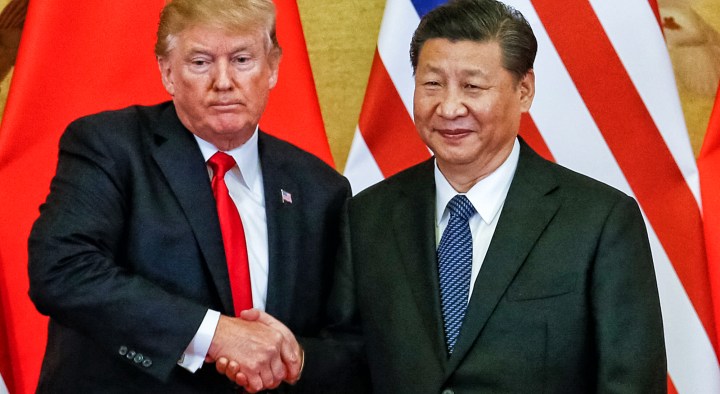OP-ED
The real meaning behind the clash of the world’s two superpowers

Albert Einstein is reputed to have defined insanity as “doing the same thing over and over and expecting different results”. Nothing illustrates the importance of this axiom than in the so-called trade war between America and China.
On the announcement of a trade deal between Presidents Xi Jinping and Donald Trump, Wall Street stocks jumped up and shares in the Hong Kong Hang Seng Index produced positive gains. However, this bonhomie, while welcomed by the rest of the world’s markets, will not last forever.
The Sino-America trade war is a misnomer since it focuses on symptoms rather than the underlying causal factors. The clash between the world’s two major economic superpowers is not primarily about trade and technology. It is a “clash of cognitions” as the US Defence Intelligence Agency analyst, Joseph Kerbel, said in 2009.
North America and the People’s Republic of China have two oppositional understandings of their international roles and responsibilities.
While America has self-appointed itself the role of imposing the market economy and liberal democracy, by martial might or economic sanctions, on other countries, on the other hand, China prioritises respecting other countries’ sovereignty and winning over, allies and foes, through mutual benefit co-operation.
While Presidents Trump and Barack Obama were united in their fundamentalist belief in America’s “manifest destiny” and “exceptionalism”, China accepts the reality of our modern polycentric world dominated by many regional and sub-regional hegemons.
The recent stand-off between India and Pakistan, as both independent nuclear powers, underlines the fact that mutually assured destruction of the world not only hinges on Sino-America relations, but on ensuring the improvement of harmony even among second-tier superpowers.
It is simplistic to argue the Sino-America trade war boils down to firstly, China allegedly extorting US technology, and secondly, using cyber technology to steal American technology for benefit of its own companies as the arrest and threatened deportation, of Huawei’s chief financial officer, Men Wanzhou, indicates.
Kerbel’s differentiation of the varying outlooks of America and China is reducible to the following factors. China is a society that privileges collective interdependence in relations between the state and society, and in relationships in the family, work, and business. This contrast sharply with the individualist western outlook where there is a clear separation between the state and society and the private sector.
While China sees and approaches the world as a complex whole with unpredictable components, America views the world as reducible to identifiable heroes (Juan Guaido) and villains (Nicolas Maduro). This Newtonian cause-and-effect attitude, which includes adopting a gung-ho approach to international affairs, as highlighted by American foreign policy being led by arch-neoconservatives like Elliot Abrams and John Bolton, is directly responsible for the catastrophes in Iraq, Afghanistan, Syria, Ukraine where the US sought to impose its will without due consideration of the internal country’s dynamics.
America’s perspective then, is linear and short-termist, used ultimately for imperial economic gain (oil!), without calculating the negative geostrategic effects of the removal of Maduro.
North and East Africa know full well the detrimental costs of a reductionist mindset with Libya being forced to transition from having the highest human development index, prior to 2011, to now being reduced to a failed state which is a chief exporter of terrorist cells to Europe and surrounding countries.
This is precisely the reason America’s elder statesman and a consigliere to many living and departed presidents, Henry Kissinger, was wise enough to illustrate the differences between the American and Chinese stances through the games of chess and weiqi or China’s equivalent of chess.
Kissinger counsels that, “chess has only two outcomes: draw and checkmate. The objective is total victory or defeat”. On the other hand, weiqi’s objective is “relative advantage” and “to increase one’s options and reduce those of the adversary. The goal is less victory than persistent strategic progress”.
While America pursues short-term gain to address constituency concerns and gain electoral advantages every four to five years, China pursues a much more longer-term standpoint. This explains the very high savings rates in China for both the state and for individual families or clans. Hence a typical Chinese family typically invests ahead, for three to four generations. Contrast this with America’s unsustainable proclivity for living beyond their means through credit with the national debt standing well over $20-trillion and counting.
At the risk of being accused of being panda huggers or China admirers, there are obvious lessons here for Africa and South Africa.
It encourages us to appreciate the distinction between complexity and complicated. A complicated viewpoint (ie, America’s) would see the world as linear and mechanical that requires predictable solutions. Moreover, a more nuanced approach would see the world as complex with autonomous individual components that are unpredictable and as such, require holistic and adaptable solutions that change from situation to situation.
It is to be recalled that China is not new to world civilisation and global ascendancy. For thousands of years, it was a leader in science and technology by giving the world genius inventions such as anatomy (11th Century AD), antimalarial drugs ((3rd Century BC), printed books (868 AD), chess (4th century BC), magnetic compass (1111 AD), gunpowder formula (9th Century AD), construction of ships principle (1st Century BC), and centrally mounted wheelbarrow (30 BC).
It is therefore not surprising that former America’s secretary of state, John Hay, predicted in 1899 that China would eventually be “the storm centre of the world” and become “a key to politics for the next five centuries”. DM
Paul Zilungisele Tembe is a Fellow at TMALI and Associate Professor of Zhejiang Normal University and Jeffrey Sehume is a contracted public servant.


















 Become an Insider
Become an Insider